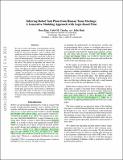| dc.contributor.author | Kim, Been | |
| dc.contributor.author | Chacha, Caleb M. | |
| dc.contributor.author | Shah, Julie A | |
| dc.date.accessioned | 2018-06-04T15:28:24Z | |
| dc.date.available | 2018-06-04T15:28:24Z | |
| dc.date.issued | 2015-03 | |
| dc.identifier.issn | 1943-5037 | |
| dc.identifier.issn | 1076-9757 | |
| dc.identifier.uri | http://hdl.handle.net/1721.1/116054 | |
| dc.description.abstract | We aim to reduce the burden of programming and deploying autonomous systems to work in concert with people in time-critical domains, such as military field operations and disaster response. Deployment plans for these operations are frequently negotiated on-the-fly by teams of human planners. A human operator then translates the agreed upon plan into machine instructions for the robots. We present an algorithm that reduces this translation burden by inferring the final plan from a processed form of the human team's planning conversation. Our approach combines probabilistic generative modeling with logical plan validation used to compute a highly structured prior over possible plans. This hybrid approach enables us to overcome the challenge of performing inference over the large solution space with only a small amount of noisy data from the team planning session. We validate the algorithm through human subject experimentation and show we are able to infer a human team's final plan with 83% accuracy on average. We also describe a robot demonstration in which two people plan and execute a first-response collaborative task with a PR2 robot. To the best of our knowledge, this is the first work that integrates a logical planning technique within a generative model to perform plan inference. © 2013, Association for the Advancement of Artificial Intelligence (www.aaai.org). All rights reserved. | en_US |
| dc.publisher | Association for Computing Machinery | en_US |
| dc.relation.isversionof | https://dl.acm.org/citation.cfm?id=2831415 | en_US |
| dc.rights | Creative Commons Attribution-Noncommercial-Share Alike | en_US |
| dc.rights.uri | http://creativecommons.org/licenses/by-nc-sa/4.0/ | en_US |
| dc.source | arXiv | en_US |
| dc.title | Inferring robot task plans from human team meetings: A generative modeling approach with logic-based prior | en_US |
| dc.type | Article | en_US |
| dc.identifier.citation | Kim, Been, Caleb M. Chacha and Julie A. Shah. "Inferring team task plans from human meetings: a generative modeling approach with logic-based prior." Journal of Artificial Intelligence Research 52, no 1 (January 2015): 361-398. | en_US |
| dc.contributor.department | Massachusetts Institute of Technology. Computer Science and Artificial Intelligence Laboratory | en_US |
| dc.contributor.department | Massachusetts Institute of Technology. Department of Aeronautics and Astronautics | en_US |
| dc.contributor.department | Massachusetts Institute of Technology. Department of Electrical Engineering and Computer Science | en_US |
| dc.contributor.mitauthor | Kim, Been | |
| dc.contributor.mitauthor | Chacha, Caleb M. | |
| dc.contributor.mitauthor | Shah, Julie A | |
| dc.relation.journal | Journal of Artificial Intelligence Research | en_US |
| dc.eprint.version | Original manuscript | en_US |
| dc.type.uri | http://purl.org/eprint/type/ConferencePaper | en_US |
| eprint.status | http://purl.org/eprint/status/NonPeerReviewed | en_US |
| dc.date.updated | 2018-04-10T17:44:52Z | |
| dspace.orderedauthors | Kim, Been ; Chacha, Caleb M. ; Shah, Julie A. | en_US |
| dspace.embargo.terms | N | en_US |
| dc.identifier.orcid | https://orcid.org/0000-0003-1338-8107 | |
| mit.license | OPEN_ACCESS_POLICY | en_US |
